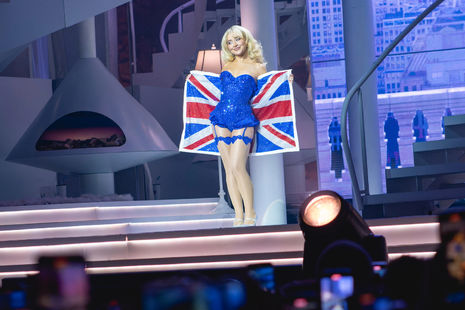Is Sabrina Carpenter a feminist? (and why it matters)
Harmony Mitchell reflects upon the controversies of Sabrina Carpenter

Picture a parody of the 60s pin-up – adorn with stripes, hold up stockings, the pristine blonde blow out – Sabrina Carpenter has a brand. But, unlike the pin up, she is three dimensional, talking back to (and about) men in a series of euphemisms, witty remarks, and even downright insults. Yet, in spite of this edge of defiance, I feel rather uncomfortable to see the word feminism bouncing around in proximity to Sabrina Carpenter. I think such a statement negates the core premise of feminist art: to destabilise the normality of female subordination through language, images, and self-presentation.
After the release of infamous Man’s Best Friend cover, which depicts Carpenter, dog-like, at the feet of a faceless man, three broad responses circulated. For one, outrage; the image is an archetypal display of misogyny, endorsing patriarchal violence at the detriment of young female audiences. Responding to this, a ‘post-left’ style argument held that we must embrace the cover’s irony, lest feminism wants to fall into puritanical alliances with the far right. And, finally, the choice feminism response; as a knowing, empowered subject Sabrina Carpenter can choose whatever feels good, women shouldn’t be told their experiences and desires are ‘not feminist enough’.
“Satire should use the ridiculous to make humorous social commentary”
All of these, I think, have some truth but only scratch the surface. Women can do whatever they so wish, but Sabrina Carpenter is also a pop star, a representation, a cultural phenomenon. Her intent seems to be well placed – her expression of support for the trans community in recent VMA performance, for instance, is one of the most feminist things an individual can do in today’s political climate.
Yet whilst I don’t think that Sabrina Carpenter is a far-right government psyop (Sydney Sweeney I’m looking at you), nonetheless the representational practices she engages in cannot be severed from their social connotations. Carpenter evokes a look rooted in a nostalgia for mid 20th century femininity, something which, had she leant into the theatrical and the subversive, could have been genuinely interesting. Instead, her album cover decided to veer towards the choreography of a sexist 1960s advert. All the while, the ‘hot blonde’ cultural figure is being weaponised as antithetical to ‘woke’, and the USA descends into an authoritarian populism whereby women’s rights recede. Satire should use the ridiculous to make humorous social commentary. This may have been fitting if 1960s misogyny had become so far removed from reality that it was absurd, or if Carpenter expressed such strong feminist sentiments that her subservience was clearly humorous. But since neither of these are the case, it falls flat. The fact that so many ‘believed’ the cover proves this, despite Carpenter claiming she was “clearly in control”. I don’t really buy the ‘declining media literacy’ arguments; I think the truth of the matter is it’s just not very good.
So I excitedly awaited Man’s Best Friend’s release, hoping a concept album or some bold lyricism would salvage the ‘satire’ of it. I found myself disappointed. The first two tracks dipped their toes into gender politics – ‘Manchild’ makes digs at a useless boyfriend who makes you do everything; ‘Tears’ again deals with emotional labour, lusting over men who have basic life sustaining skills. But we are otherwise left wanting, with no lyricism that warrants the title and cover’s politically provocative symbolism.
“As a teenage girl I was given language to convey grievances that I did not yet have my own words for”
Admittedly, Carpenter’s wider discography does sometimes invert gender dynamics, positioning herself as holding power over men: “wrapped round my finger,” “I know you want my touch for life,” “sorry if you feel objectified”. But in such cases, her power seems to derive from her beauty – a femme fatale, who having attained the ultimate status of desirable, can get away with toying with men.
Women under patriarchy have always criticised men in everyday forms – gossiping about husbands, small acts of resistance within the domestic sphere – and Sabrina Carpenter inherits this tradition, now in the form of complaining at men being bad texters. Not every female artist needs to sing about structural misogyny, but her half-hearted attempts at political satire without tangible critique end up being rather regressive.
I’ve seen that Courtney Love tweet circulate multiple times – about how Taylor Swift is not particularly interesting artistically, but is a safe space for girls. I think this is true, but I also think girls deserve more than these surface level articulations of men being rubbish. Through brilliant female musicians, as a teenage girl I was given language to convey grievances that I did not yet have my own words for. To reject the sexual politics of the likes of Carpenter does not necessitate puritanism. For instance, Riot Grrrl acts like Bikini Kill, are incredibly crass, with songs like ‘Sugar’ about being “a self-fulfilling porno queen,” or in other words the performance of sexual submission. PJ Harvey’s ‘Dry’ is about men not getting her off. And alternatively tracks like the Slits’ ‘Typical Girls’ acknowledges the normative expectations inflicted upon women, even acknowledging that this is systemic: “There’s another marketing ploy / Typical girl gets the typical boy”.
I am not anti-pop, nor do I dislike contemporary music, but I am incredibly frustrated by this shift towards an institutionalised feminism in music which neglects meaningful political commentary. There was a certain willingness in the latter decades of the 20th century to talk bluntly about gender politics, and the lack of this willingness is leading to artists like Sabrina Carpenter creating dodgy satire and yet still being the most feminist thing young girls have.
 Comment / The (Dys)functions of student politics at Cambridge19 January 2026
Comment / The (Dys)functions of student politics at Cambridge19 January 2026 Arts / Exploring Cambridge’s modernist architecture20 January 2026
Arts / Exploring Cambridge’s modernist architecture20 January 2026 Features / Exploring Cambridge’s past, present, and future18 January 2026
Features / Exploring Cambridge’s past, present, and future18 January 2026 News / Local business in trademark battle with Uni over use of ‘Cambridge’17 January 2026
News / Local business in trademark battle with Uni over use of ‘Cambridge’17 January 2026 News / Your Party protesters rally against US action in Venezuela19 January 2026
News / Your Party protesters rally against US action in Venezuela19 January 2026









